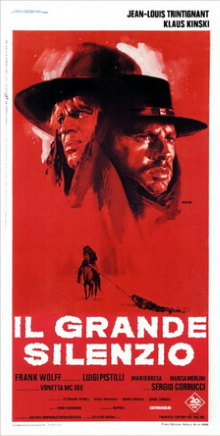
Despite what I wrote last time around, I still haven’t gotten around to watching the first two films of the so called Dollars trilogy. This one however is another Spaghetti Western, that is an Italian-made film set in the American West. It was directed by Sergio Corbucci and even features a score by Ennio Morricone. With all of the leads here being played by Europeans rather than Americans, it does feel much more European than The Good, the Bad and the Ugly, which we found quite discomfiting.
Harsh conditions have forced a large group of people near the town of Snow Hill to turn to theft to survive. The local banker and justice of the peace Pollicut places bounties on them, attracting bounty hunters to the area. Though ostensibly operating within the bounds of the law, they are opportunistic and corrupt. When one particularly notorious bounty hunter Loco guns down one of the so-called bandits, his wife Pauline calls for a mute gunfighter known only as Silence to seek vengeance on her behalf. Silence has a private grievance of his own against bounty hunters and his modus operandi is to provoke his targets to draw first so that he can legally kill them. In the meantime, a new sheriff Burnett makes his way to the town and has a run-in with the hungry bandits. However he seems to sympathize with their plight and understands that Pollicut and Loco are the real villains.
The plot here is extremely, perhaps excessively, simple but between the strangeness of Europeans pretending to be Americans and how the film seems to treat the bounty hunters as the villains and the bandits as the oppressed and downtrodden, it can be to grasp what the film is going for. That’s quite the reversal from the usual dynamics of American Westerns. I decided that the director is making some kind of political statement, perhaps inspired by some contemporary event in Europe at that time. In fact, the director is referring to the deaths of idealistic heroes like Che Guevera and Malcolm X. I’m of two minds about that. On the one hand, this does take a film that I originally thought would be a conventional action movie in a rather shocking direction. Yet as an allegory, the fiction fits awkwardly with historical reality as the parallels are too weak. The protagonist is after all mute and can hardly call anyone to action. The bandits are a bunch of undifferentiated peasants with no characterization. I think it’s more likely that the director had grown bored of the genre and just wanted to do something different.
There are some nice touches that I liked in this film. We tend not to see Westerns set amidst a snowy landscape as much and despite a low budget that necessitated some obvious camera tricks, this film looks pretty good. The bitter cold and heavy snow gives the impression that the bandits are hungry refugees while the bounty hunters drink and gamble with their earnings. I also found it interesting that Silence uses an unusual German pistol which is semi-automatic, allowing him to fire very rapidly. On the other hand, Loco uses the very traditional Colt Single Action Army pistol. I don’t think it would have been possible for a real American movie to have the hero and the villain flip around the usual weapon choices in this way. This also reinforces the sense that this isn’t America at all but some strange figurative version of it.
On the whole, while I can see why this is now considered a classic of the genre, I found that I don’t like it all that much. It is beautiful and the ending is a real shock but all of the bits and pieces are so disparate and don’t fit well together. Having a mute protagonist also severely limits what they can do with his story. It’s an enjoyable western but no more than that.